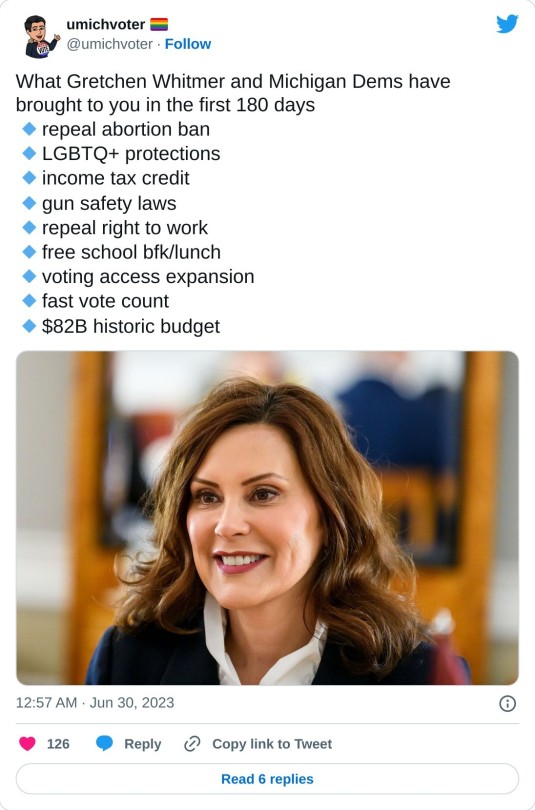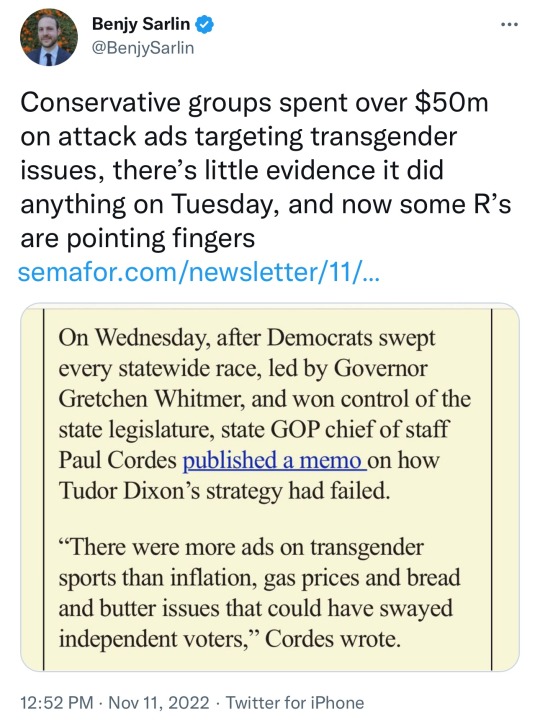#gretchen whitmer
Text
LGBTQ+ organizations and allies are celebrating Michigan for becoming the first state in three years to pass comprehensive anti-discrimination protections for sexual orientation and gender identity. The legislation, which now heads to Gov. Gretchen Whitmer (D) to be signed into law, finally passed after decades of court battles and hold-ups from Republican legislators.
The bill passed in a 64-45 vote in the Democrat-led House on Wednesday. It amends the state’s 1976 Elliott-Larsen Civil Rights Act (ELCRA) to include LGBTQ+ people among its protected groups. The law forbids discrimination in housing, employment, and public accommodation within businesses, government buildings, and educational facilities on the basis of religion, race, color, national origin, age, sex, height, weight, familial status, marital status — and now, LGBTQ+ identity.
Democrats had tried introducing various LGBTQ+ non-discrimination measures over the last 40 years, according to the bill’s gay sponsor Sen. Jeremy Moss (D). However, the attempts were repeatedly voted down by Republican-led legislatures. Last January, Democrats took control of the full legislature for the first time in nearly 40 years, finally giving them the chance to pass the protections.
In July 2022, Michigan’s Supreme Court issued a landmark 5–2 ruling that ELCRA already forbade discrimination based on sexual orientation and gender identity as forms of discrimination based on sex and gender. This followed a 2020 Michigan Court of Claims ruling that said ELCRA didn’t ban anti-gay discrimination as well as a 2018 vote by Michigan’s Civil Rights Commission interpreting ELCRA as protecting LGBTQ+ people from religious-based discrimination...
When the House voted to pass the historic bill on Wednesday, a crowd in the House gallery broke into applause, Bridge Michigan reported. Republican House members had tried adding amendments that would’ve carved out exceptions for religious people to continue discriminating against LGBTQ+ people. None of these amendments passed into the final bill.
Gov. [Whitmer] has signaled that she will soon sign the bill into law. In a Wednesday tweet, she noted the observation of International Women’s Day and wrote, “I’m celebrating trans women who have continuously led the way, despite constant threats to their lives and liberty. I’m proud that we’re finally in a position to expand the Elliott-Larsen Civil Rights Act to protect LGBTQ+ Michiganders. Let’s get it done!”
-via LGBTQ Nation, 3/9/23
Note: If it's not clear from the language, this is basically a done deal--the bill signing IS ABSOLUTELY GOING TO HAPPEN.
As scary as things are right now, there are so many of us fighting to protect ourselves, our communities, and the queer and trans people around us.
This comes only a day after Minnesota's governor signed a landmark executive order that guarantees the right to gender-affirming care and prevents the state from complying with any other states' attempts to interfere. via them.us, 3/9/23
There is hope, and there are so many people fighting for us.
#transgender#trans#trans rights#trans healthcare#top surgery#gender affirming care#trans rights are human rights#michigan#united states#us politics#gretchen whitmer#democrats#voting matters#lgbtq#lgbtq rights#transphobia cw#good news#hope
8K notes
·
View notes
Text

3K notes
·
View notes
Text

#Transgender#politics#gop#twitter#michigan#trabs#lbgtqa#trump#ron desantis#gretchen whitmer#usa#news
1K notes
·
View notes
Text

sick of election season already. stop funding genocide
20 notes
·
View notes
Text
Kendrick on Michigan
90 notes
·
View notes
Video
Michigan Gov. Whitmer repeals abortion ban from 1931
#tiktok#michigan#reproductive justice#reproductive freedom#reproductive rights#reproductive choice#reproductive health#Healthcare#Health Care#LGBTQ#gretchen whitmer
65 notes
·
View notes
Text
Gretchen Whitmer Is Taking Her Defense Of Abortion, LGBTQ+ Rights Directly To Red States
20 notes
·
View notes
Text

That's my Governor!💙👏🌟
26 notes
·
View notes
Link
From the February 7, 2024 article:
Illinois Gov. J.B. Pritzker is tapping his personal wealth to try to enshrine abortion access in battleground states, making an election-year push to support ballot measures and expanding his national footprint in the Democratic Party, within which he is regarded as a potential 2028 presidential candidate.
...
Politicians eyeing a White House bid often get involved in key states beyond their home base, and other Democrats viewed as 2028 contenders have made similar moves. California Gov. Gavin Newsom last year launched a nonprofit, seeded with campaign money, to push back on abortion bans and other conservative policies in red states. Michigan Gov. Gretchen Whitmer is fundraising for federal candidates through a political action committee. Kentucky Gov. Andy Beshear — in the spotlight after his 2023 reelection in a bright-red state — recently launched a group backing Democrats nationwide.
10 notes
·
View notes
Text
The 2022 Almost-Post Mortem
I was a bit hesitant to write my post-mortem recap today, since some very important races remain uncalled. Incredibly, both the House and Senate remain uncalled, though the GOP is favored in the former and Democrats have the slight advantage in the latter. It would be truly delightful if Catherine Cortez Masto can squeak out a win in Nevada and so make the upcoming Georgia run-off, if not moot, then slightly less high stakes. But again, things are up in the air that ought make a big difference in the overall "narrative" of the day.
Nonetheless, I think some conclusions can be fairly drawn at this point. In no particular order:
There was no red wave. It was, at best, a red trickle. And given both the underlying fundamentals on things like inflation and the historic overperformance of the outparty in midterm elections, this is just a truly underwhelming performance for the GOP. No sugarcoating that for them.
If Trafalgar polling had any shame, they'd be shame-faced right now, but they have no shame, so they'll be fine.
In my 2018 liveblog, I wrote that "Some tough early results (and the true disappointment in Florida) has masked a pretty solid night for Democrats." This year, too, a dreadful showing in Florida set an early downer tone that wasn't reflected in the overall course of the evening. Maybe it's time we just give up the notion that Florida is a swing state?
That said, Republicans need to get out of their gulf-coastal-elite bubble and realize that what plays in Tallahassee doesn't play in the rest of the country.
That's snark, but also serious -- for all the talk about how "Democrats are out-of-touch", it seems that the GOP also has a problem in not understanding that outside of their fever-swamp base most normal people maybe don't like the obsession with pronouns and "kitty litter" and "anti-CRT". Their ideological bubble is at this point far more impermeable, and far more greatly removed from the mainstream, than anything comparable among Democrats.
Abortion is maybe the biggest example of this, as anti-choice measures keep failing in even deep red states like Kentucky, while pro-choice enactments sail to victory in purple states like Michigan (to say nothing of blue bastions like California). Democratic organizers should make a habit of just putting abortion on the ballot in every state, and ride those coattails.
It's going to fade away almost immediately, but I cannot get over the cynical bad faith of what happened regarding baseless GOP insinuations that any votes counted after election day were inherently suspicious. On November 7, this was all one heard from GOP officials across the country, even though delays in counting are largely the product of GOP-written laws. But on November 8, when they found themselves behind on election night returns, all of the sudden folks like Kari Lake are relying on late-counted votes to save them while raising new conspiracies about stolen elections. Sickening.
Given the still powerful force of such conspiracy mongering, Democrats holding the executive branch in key swing states like Wisconsin and Michigan is a huge deal. Great job, guys.
For the most part, however, most losing MAGA candidates are conceding. Congratulations on clearing literally the lowest possible bar to set.
The GOP still should be favored to take over the House, albeit with a razor-thin majority. And that majority, in turn, seems almost wholly attributable to gerrymandering -- both Democrats unilateral disarmament in places like New York, but also truly brutal GOP gerrymanders in places like Florida. This goes beyond Rucho, though that case deserves its place in the hall of shame. The degree to which the courts bent over backwards to enable even the most nakedly unlawful districting decisions -- the absurd lawlessness of Ohio stands out, but the Supreme Court's own decision to effectively pause enforcement of the Voting Rights Act because too many Black people entering Congress qualifies as an "emergency" on the shadow docket can't be overlooked either -- is one of the great legal disgraces of my lifetime in a year full of them.
Of course, I have literally no idea how the Kevin McCarthy will corral his caucus with a tiny majority. Yes, it gives crazies like Greene and Boebert (well, maybe not Boebert ...) more power, but that's because it gives everyone in the caucus more power, which is just a recipe for chaos. Somewhere John Boehner is curling up in a comfy chair with a glass of brandy and getting ready to have a wonderful day.
My new proposal for gerrymandering in Democratic states: "trigger" laws which tie anti-gerrymandering rules to the existence of a national ban. If they're banned nationwide, the law immediately goes into effect. Until they are, legislatures have free reign. That way one creates momentum for a national gerrymandering ban while not unilaterally disarming like we saw in New York. Could it work? Hard to know -- but worth a shot.
Let's celebrate some great candidates who will be entering higher office! Among the many -- and this is obviously non-exhaustive -- include incoming Maryland Governor Wes Moore, incoming Pennsylvania Governor Josh Shapiro, incoming Pennsylvania Senator John Fetterman. Also kudos to some wonderful veterans who held their seats in tough environs, including Michigan Governor Gretchen Whitmer, Virginia congresswoman Abigail Spanberger, New Jersey congressman Andy Kim, Maine Governor Janet Mills, and New Hampshire Senator Maggie Hassan.
Special shoutout to Tina Kotek, who overcame considerable headwinds (and the worst Carleton alum) to apparently hold the Governor's mansion in my home state of Oregon. Hopeful that Jaime McLeod-Skinner can eke out a victory in my congressional district too, though it looks like that might come down to the wire.
I also think it's important to give credit even to losing candidates who fought hard races. Tim Ryan stands out here -- not only did he force the GOP to spend badly needed resources in a state they should've had no trouble keeping, but his coattails might have pushed Democrats across the finish line in at least two House seats Republicans were favored to hold. (I hate to say it, but Lee Zeldin may have played a similar role for the GOP in New York).
I'm inclined to agree that, if Biden doesn't run in 2024, some of the emergent stars from this cycle (like Whitmer or Shapiro) are stronger picks for a presidential run than the also-rans from 2020. But I also think that Biden likely will get an approval bump off this performance -- people like being associated with winners!
On the GOP side, the best outcome (from my vantage) is Trump romping to a primary victory and humiliating DeSantis -- I think voters are sick of him. The second best outcome might be DeSantis winning narrowly over Trump and provoking a tantrum for the ages that might rip the GOP apart. DeSantis himself, as a presidential candidate, is an uncertainty -- I'm not convinced he plays well outside of Florida, but I am convinced that if he prevails over Trump the media will fall over itself to congratulate the GOP on "repudiating" Trumpism even though DeSantis is materially indistinguishable from Trump along every axis save that he's not abjectly incompetent (which, in this context, is not a plus).
The hardest thing to do is to recognize when even candidates you really like are, for whatever reason, just not going to get over the hump. This fits Charlie Crist, Beto O'Rourke, and (I'm sorry) Stacey Abrams. It's no knock on them -- seriously, it isn't -- but they're tainted goods at this point. Fortunately, Democrats have a deep bench of excellent young candidates who we can turn to next time around.
And regarding the youth -- I'm not someone who's a big fan of the perennial Democratic sport of Pelosi/Schumer sniping. I think they've both done a very good job under difficult circumstances, and deserve real credit for the successes we saw tonight and across the Biden admin more broadly. However, we do need to find room for some representatives from the younger generation to assume leadership roles. Younger voters turned out hard for the Democratic Party and deserve their seat at the table. It says something that Hakeem Jeffries, age 52, is the immediate current leadership figure springing to mind as a "young" voice -- that (and again, there's no disrespect to Jeffries here) is not good enough.
via The Debate Link https://ift.tt/1YJTzbo
134 notes
·
View notes
Text
"For the first time in almost 60 years, a state has formally overturned a so-called “right to work” law, clearing the way for workers to organize new union locals, collectively bargain, and make their voices heard at election time.
This week, Michigan finalized the process of eliminating a decade-old “right to work” law, which began with the shift in control of the state legislature from anti-union Republicans to pro-union Democrats following the 2022 election. “This moment has been decades in the making,” declared Michigan AFL-CIO President Ron Bieber. “By standing up and taking their power back, at the ballot box and in the workplace, workers have made it clear Michigan is and always will be the beating heart of the modern American labor movement.”
[Note: The article doesn't actually explain it, so anyway, "right to work" laws are powerful and deceptively named pieces of anti-union legislation. What right to work laws do is ban "union shops," or companies where every worker that benefits from a union is required to pay dues to the union. Right-to-work laws really undermine the leverage and especially the funding of unions, by letting non-union members receive most of the benefits of a union without helping sustain them. Sources: x, x, x, x]
In addition to formally scrapping the anti-labor law on Tuesday [February 13, 2024], Michigan also restored prevailing-wage protections for construction workers, expanded collective bargaining rights for public school employees, and restored organizing rights for graduate student research assistants at the state’s public colleges and universities. But even amid all of these wins for labor, it was the overturning of the “right to work” law that caught the attention of unions nationwide...
Now, the tide has begun to turn—beginning in a state with a rich labor history. And that’s got the attention of union activists and working-class people nationwide...
At a time when the labor movement is showing renewed vigor—and notching a string of high-profile victories, including last year’s successful strike by the United Auto Workers union against the Big Three carmakers, the historic UPS contract victory by the Teamsters, the SAG-AFTRA strike win in a struggle over abuses of AI technology in particular and the future of work in general, and the explosion of grassroots union organizing at workplaces across the country—the overturning of Michigan’s “right to work” law and the implementation of a sweeping pro-union agenda provides tangible evidence of how much has changed in recent years for workers and their unions...
By the mid-2010s, 27 states had “right to work” laws on the books.
But then, as a new generation of workers embraced “Fight for 15” organizing to raise wages, and campaigns to sign up workers at Starbucks and Amazon began to take off, the corporate-sponsored crusade to enact “right to work” measures stalled. New Hampshire’s legislature blocked a proposed “right to work” law in 2017 (and again in 2021), despite the fact that the measure was promoted by Republican Governor Chris Sununu. And in 2018, Missouri voters rejected a “right to work” referendum by a 67-33 margin.
Preventing anti-union legislation from being enacted and implemented is one thing, however. Actually overturning an existing law is something else altogether.
But that’s what happened in Michigan after 2022 voting saw the reelection of Governor Gretchen Whitmer, a labor ally, and—thanks to the overturning of gerrymandered legislative district maps that had favored the GOP—the election of Democratic majorities in the state House and state Senate. For the first time in four decades, the Democrats controlled all the major levers of power in Michigan, and they used them to implement a sweeping pro-labor agenda. That was a significant shift for Michigan, to be sure. But it was also an indication of what could be done in other states across the Great Lakes region, and nationwide.
“Michigan Democrats took full control of the state government for the first time in 40 years. They used that power to repeal the state’s ‘right to work’ law,” explained a delighted former US secretary of labor Robert Reich, who added, “This is why we have to show up for our state and local elections.”"
-via The Nation, February 16, 2024
#michigan#united states#us politics#labor#labor rights#labor unions#capitalism#unions#unionize#gretchen whitmer#democrats#voting matters#right to work#pro union#workers#workers rights#good news#hope
1K notes
·
View notes
Text



#Michigan#news#tudor dixon#gretchen whitmer#democrats#republicans#politics#donald trump#scotus#usa#rape tw
390 notes
·
View notes
Text
#pitting 2 bb`s against each other#you hate to see it but im doing it#michigan#gretchen whitmer#dana nessel#poll
14 notes
·
View notes
Text
youtube
Michigan is not exactly a bellwether in the strictest sense of the word. However it is still one of the best places to observe trends in American politics.
I clicked the video above expecting to watch just the first few seconds but ended up watching the entire 18 minutes.
It focuses on Michigan because the double peninsula state offers a useful reflection of various directions in politics nationwide. And the vid is nicely done.
One thing we should particularly note about Michigan is that after Democrats won a trifecta there in 2022, they quickly set about making the state more progressive. They repealed anti-union and anti-abortion laws, strengthened LGBTQ+ protections, and abolished the state's peculiar retirement tax. And even before the trifecta, the party helped pass an anti-gerrymandering amendment which later turned out to be key.
Something to learn from Michigan: Pay a lot more attention to your own state government. The first step is to find out who your legislators are.
Find Your Legislators
Look your legislators up by address or use your current location.
If you have the misfortune to be represented by MAGA Republicans, contact your state or county Democratic Party and ask what you can do to help send those varmints packing.
#michigan#us politics#michigan politics#election 2008#election 2010#election 2012#election 2014#election 2016#election 2018#election 2020#election 2022#election 2024#gretchen whitmer#michigan legislature#state legislatures#vote blue no matter who
4 notes
·
View notes
